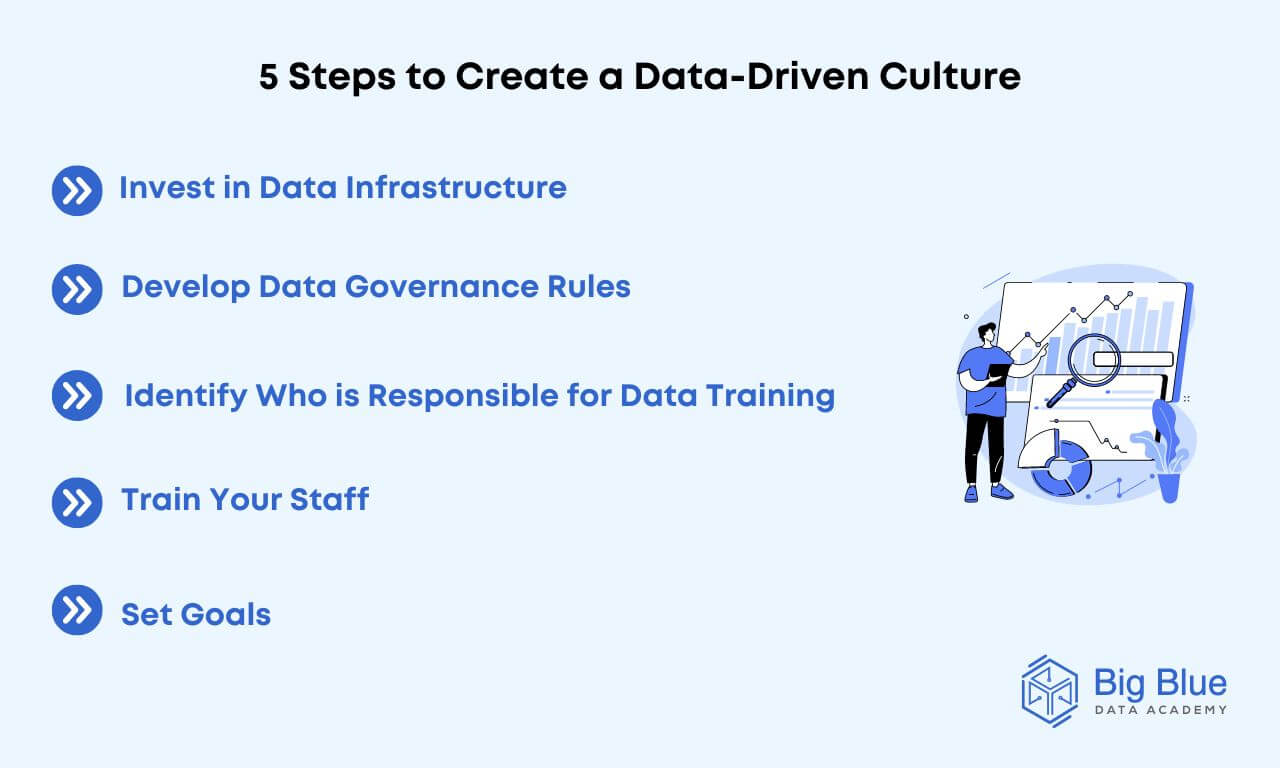How to Create a Data-Driven Culture in Your Company (2023)
Undoubtedly, an organization or business that focuses on the systematic use and analysis of a wealth of data can better guide strategic decision-making in a highly effective manner.
The universal integration of data into the daily activities of company members through the creation of a data-driven culture is crucial for its progress.
In today's article, we will explore:
What is data-driven culture?
What are the advantages it offers?
How can you create a data-driven culture?
Let's start with a basic definition.
What is Data-Driven Culture?
A data-driven culture is one where individuals working within a company utilize detailed information and skills to optimize processes and make data-driven strategic decisions.
By collecting data, both data teams and top-level executives can extract valuable insights about the impact of their decisions before implementing changes or new policies.
Companies that focus on creating a data-driven culture empower people at every level to understand data and its application, providing them with the necessary skills to work with it effectively.
Advantages of a Data-Driven Culture
The main advantages of a data-driven culture are as follows:
Improved Collaboration
In an environment where a data-driven culture is fostered, collaboration within the data team and among different members, such as data scientists and data analysts, is significantly facilitated.
By creating reports for sharing with other teams and developing data models and predictions that can be utilized by anyone in the company for research purposes, communication and collaboration are enhanced.
Competitive Advantage
Through research and data analysis, a company can maintain and strengthen its competitive advantage.
By closely monitoring changes in data with accuracy and consistency, you can meet the needs of modern customers and incorporate valuable innovations as part of your strategic business plan.
According to research conducted by McKinsey, data-driven businesses are 23 times more likely to attract new customers than those that have not invested in a similar data-driven culture.
Enhanced Productivity
By establishing a data-driven culture, you can achieve better progress monitoring and significantly enhance productivity in your business.
This allows individuals within the company to clearly define their scope of work and prioritize their tasks based on data.
Improved Decision Making
Through effective coordination and increased productivity, a data-driven culture helps businesses optimize decision-making by identifying gaps and opportunities.
How to Create a Data-Driven Culture
In today's era of digital transformation, many businesses are faced with the need to become data literate.
So, what are the key steps to creating a data-driven culture?

Let's see them as follows.
Invest in Data Infrastructure
A fundamental step is to develop systems for data collection, storage, and analysis.
Determine how much space is needed to manage data based on your organization's needs and budget.
Develop Data Governance Rules
A well-thought-out plan and rules regarding how members of your business can access company databases are essential for cultivating a data-driven culture.
Naturally, there needs to be a balance between data accessibility for everyone in the company and maintaining information security.
Identify Who is Responsible for Data Training
It is important to set priorities by clearly defining who will be responsible for data training.
The role of the Chief Data Officer is particularly significant for this purpose.
However, depending on specific needs, you can designate a specialized individual in each team.
For example, in the data science team, a data science manager who will guide and diligently train other data scientists in the company's data culture is an excellent choice and investment.
Train Your Staff
It is particularly important to train your staff through educational seminars to enhance their knowledge, filling any gaps through the process of upskilling and reskilling.
Every time you integrate new software or database systems, you can request them to complete a seminar or educational course to ensure that everything is understood.
Of course, data skills depend significantly on each individual's needs and their relationship with data in their daily work.
Additionally, it is important not to forget to reward the workforce in your company.
Set Goals
In many businesses, creating comprehensive education and literacy in data will face some challenges and obstacles.
To encourage and initiate the adoption of a data-driven culture and mindset, it is important to set goals for those upgrading their skills.
These goals need to be measurable and tailored to the specific needs of each group.
Ramping Up
We talked about what a data-driven culture is, its advantages, and some important steps to create such a culture.
As we highlighted in this article, skills in the field of data science are increasingly important for the advancement of a business in today's competitive environment.
If you want to stay updated and learn more regarding Data Science and how data is transforming businesses in different ways, follow us for more informative articles!


.jpg)